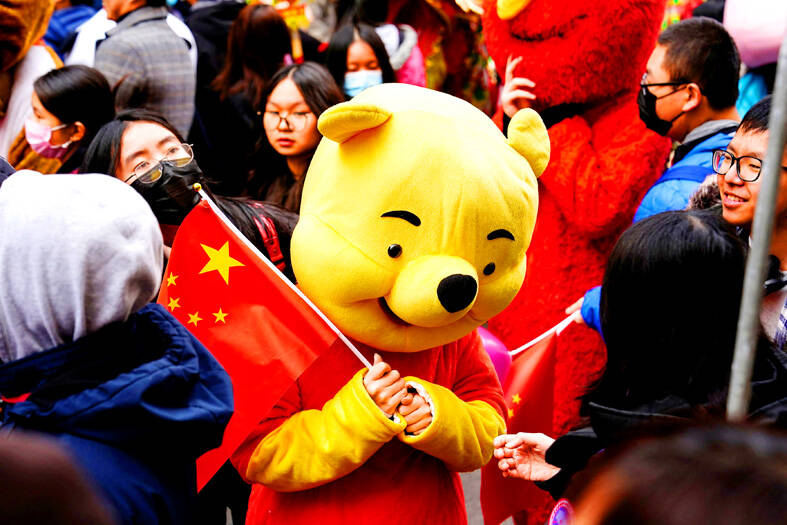China continued to repress religious freedom by destroying places of worship and detaining clergy in the first six months of the year, the Mainland Affairs Council said in a report.
Chinese officials closed down the Jokhang Temple, one of the holiest sites of Tibetan Buddhism, from March 8 to March 11, a date seemingly chosen to coincide with the anniversary of the Tibetan National Uprising Day on March 10, the council said.
Beijing has been carrying out deliberate attacks on organized religion with arrests and other means, it said, adding that religious leaders and followers were detained in tens of recorded incidents.

Photo: Reuters
In April, a Tibetan teacher was arrested after criticizing Beijing’s video propaganda targeting the Dalai Lama, it said.
Father Xie Tianming (謝天鳴), a Catholic priest leading an underground church in Hebei, was arrested and sentenced to political re-education, while six members of a familial congregation in Guandong were arrested for taking part in religion illegally, the council said.
Also in Guangdong, public security agents broke into a private residence and arrested more than 30 evangelicals who were streaming a religious video, it said.
Early this year, a large force of riot police in Zhejiang Province demolished a Presbyterian church under the pretext of facilitating the construction of a commercial building, the council said.
A dormitory of the Catholic Church in Shanxi Province was forcibly demolished in February, and three months later there were clashes in Yunnan Province between the police and local Muslims over the government’s plan to destroy a mosque, it said.
Beijing continued to contravene the freedom of speech, the council said, citing the forced disappearance of Xinjiang-based Kazakh human rights activist Zhanargul Zhumatai after she accepted an interview request by The Associated Press, the council said.
China banned the UK-produced comedy horror film Winnie the Pooh: Blood and Honey from theaters, despite its being entirely irrelevant to Chinese politics, it said.
Comedian Lee Haoshi (李昊石) was blacklisted and his company was fined 13 million yuan for producing a skit about the Chinese People’s Liberation Army, it said, adding that Chinese social media posts about the Tiananmen Massacre by foreign embassies were deleted from the platform.
Chinese President Xi Jinping (習近平) has ratcheted up repression after obtaining a third term as president at the 20th National Congress of the Chinese Communist Party in October last year, an official familiar with the matter said, speaking on condition of anonymity.
Li Yanhe (李延賀), the editor-in-chief of Taiwan-based Gusa Press (八旗文化), was arrested in April on suspicion of national security crimes while visiting family in China, where he remains in detention, they said.
Beijing’s new anti-espionage law — which greatly broadened the definition of spying and took effect last month — has triggered an exodus of foreign enterprises from China, they said.
Taiwanese academics invited to attend conferences in China were detained for hours and had their personal devices confiscated by Chinese border officials, they said, adding that religious figures were not exempt from this treatment.
People bringing in more copies of the Bible than allowed can be prosecuted under Chinese laws, he said.
Xi rules by ideology and the security of his regime is based on the use of surveillance and stabilization, which gives China’s national security apparatuses authority far greater than the offices in charge of Taiwan affairs, they said, adding that this means Taiwanese invited by the Taiwan Affairs Office or provincial “united front” organizations cannot count on their host for protection if they are detained by state security agencies, he said.

An essay competition jointly organized by a local writing society and a publisher affiliated with the Chinese Communist Party (CCP) might have contravened the Act Governing Relations Between the People of the Taiwan Area and the Mainland Area (臺灣地區與大陸地區人民關係條例), the Mainland Affairs Council (MAC) said on Thursday. “In this case, the partner organization is clearly an agency under the CCP’s Fujian Provincial Committee,” MAC Deputy Minister and spokesperson Liang Wen-chieh (梁文傑) said at a news briefing in Taipei. “It also involves bringing Taiwanese students to China with all-expenses-paid arrangements to attend award ceremonies and camps,” Liang said. Those two “characteristics” are typically sufficient

A magnitude 5.9 earthquake that struck about 33km off the coast of Hualien City was the "main shock" in a series of quakes in the area, with aftershocks expected over the next three days, the Central Weather Administration (CWA) said yesterday. Prior to the magnitude 5.9 quake shaking most of Taiwan at 6:53pm yesterday, six other earthquakes stronger than a magnitude of 4, starting with a magnitude 5.5 quake at 6:09pm, occurred in the area. CWA Seismological Center Director Wu Chien-fu (吳健富) confirmed that the quakes were all part of the same series and that the magnitude 5.5 temblor was

The brilliant blue waters, thick foliage and bucolic atmosphere on this seemingly idyllic archipelago deep in the Pacific Ocean belie the key role it now plays in a titanic geopolitical struggle. Palau is again on the front line as China, and the US and its allies prepare their forces in an intensifying contest for control over the Asia-Pacific region. The democratic nation of just 17,000 people hosts US-controlled airstrips and soon-to-be-completed radar installations that the US military describes as “critical” to monitoring vast swathes of water and airspace. It is also a key piece of the second island chain, a string of

The Central Weather Administration has issued a heat alert for southeastern Taiwan, warning of temperatures as high as 36°C today, while alerting some coastal areas of strong winds later in the day. Kaohsiung’s Neimen District (內門) and Pingtung County’s Neipu Township (內埔) are under an orange heat alert, which warns of temperatures as high as 36°C for three consecutive days, the CWA said, citing southwest winds. The heat would also extend to Tainan’s Nansi (楠西) and Yujing (玉井) districts, as well as Pingtung’s Gaoshu (高樹), Yanpu (鹽埔) and Majia (瑪家) townships, it said, forecasting highs of up to 36°C in those areas